by Barrett P. Walker and Thomas Walker, Jr.
As one of the nation's early industrialists, Thomas Walker embodied the free-enterprise spirit in his rise from humble beginnings. His son Alex Walker established a family foundation to investigate economic imbalances and causes tending to impair the free enterprise system, which he believed was responsible for creating the country's unique opportunities for self advancement and wealth.
1 
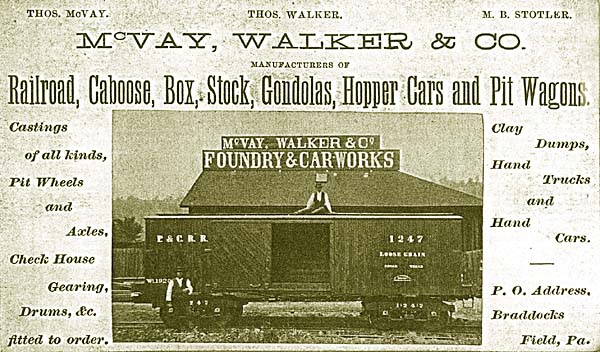 Thomas Walker, father of Alex C. Walker, was one of the early entrepreneurs of Pittsburgh.
Thomas Walker, father of Alex C. Walker, was one of the early entrepreneurs of Pittsburgh.
The story of the Foundation's history begins in Pittsburgh in 1840 with the birth of Thomas Walker. There he acquired his education in the night schools of the city and at an early age learned the machinists' trade with a local firm. He commenced at the very bottom of the ladder, his first job being the wheeling of ashes.
2 After working his way up as an employee, during the time of the Civil War he established a brewery under the name of Fawcett & Walker. However, on the advice of Thomas Marshall, a well known attorney, he withdrew from that line of business. He then established a foundry in 1863 with Thomas McVey at Braddock Field. (Five years later Braddock, PA was incorporated on the site named after the battle where British General Edward Braddock was defeated in 1755 by French and Indian Forces from Fort Duquesne. Fort Duquesne was later defeated by the British, remaned Fort Pitt, and is the location of modern Pittsburgh). The factory was eight miles southwest of downtown Pittsburgh, on the Monongahela River. McVey had invented an automatic railroad dump car, which the firm constructed. Thomas Walker was the company's president.
3
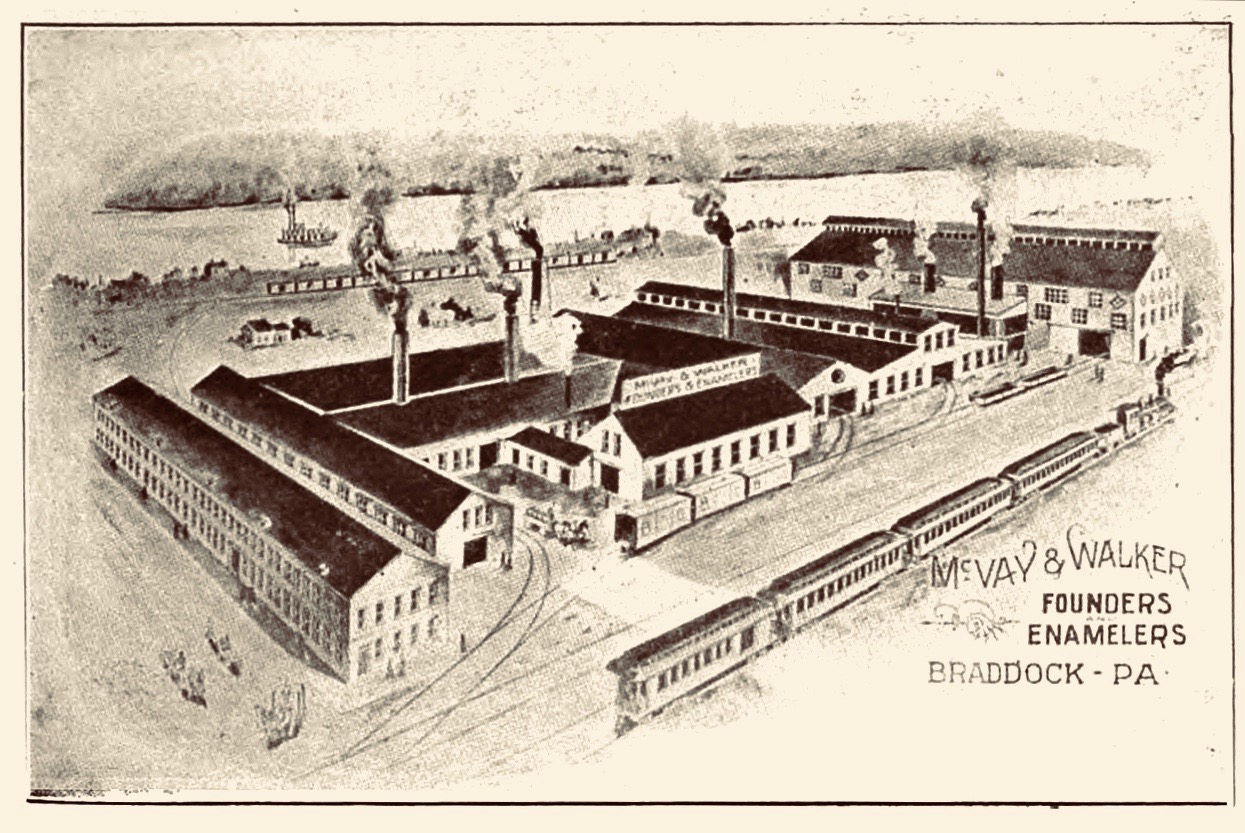 McVay & Walker Co. Plant, Braddock, PA, near Pittsburgh in 1907
McVay & Walker Co. Plant, Braddock, PA, near Pittsburgh in 1907
The business of McVey and Walker prospered, coming to employ 25 to 80 skilled artisans, depending upon the "exigencies of the trade." Eventually the firm had three departments carrying on the work of founding, car building, and forging. Thomas Walker gained full ownership upon the death of McVey. Later on the firm added the manufacture of enameled bath tubs, lavatories and cast iron pipe.
4 McVay, Walker & Co. continued to operate until one year before Walker's death in 1918.
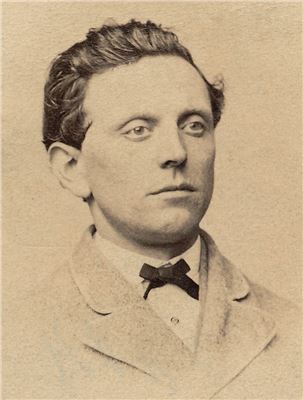 Thomas Walker in about 1878
Thomas Walker in about 1878
Thomas Walker became associated with Columbia Steel and Shafting Co. in 1900, serving as treasurer of the company. During his career he also became president and treasurer of the Griswold Wire Co. in Braddock, until it was sold to the American Steel and Wire Co. in January, 1905.
5 He was Vice President of Union Insurance, and President of the Merchants' Savings & Trust. Both companies being located in Pittsburgh. He also served as "councilman of the city at the time the present water works was constructed."
6
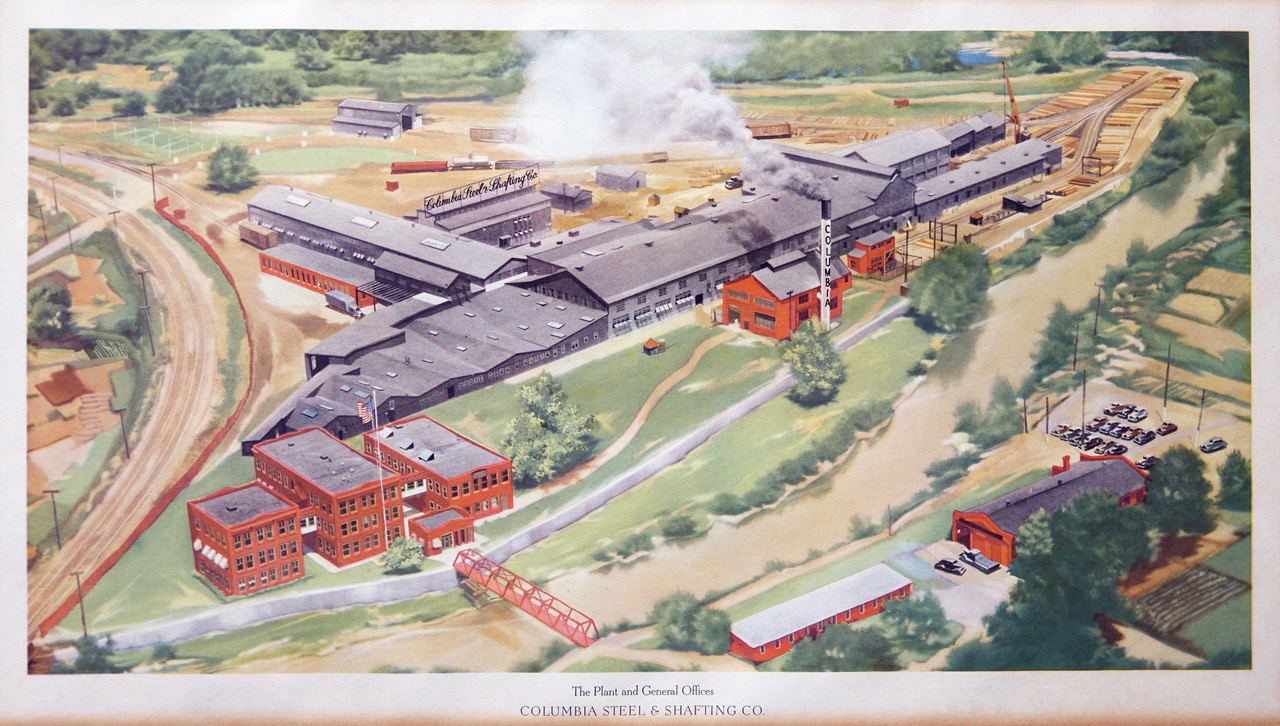 Columbia Steel & Shafting Co. Plant in Carnegie, PA, near Pittsburgh, about 1940
Columbia Steel & Shafting Co. Plant in Carnegie, PA, near Pittsburgh, about 1940
Thomas Walker married Amelia Cubbage and had two sons. Thomas Algo Walker became Vice President of the Columbia Steel & Shafting Company in Carnegie, PA and Alex Cubbage Walker became secretary and treasurer of the McVey-Walker Company.
2 While working for the family business Alex also served as a chemist for a new division, the bath tub works. There he developed different formulas for enamel coatings to make the tubs more durable. Alex always had a strong philosophy of free enterprise.
During the time that Thomas Algo Walker served as vice president, Columbia Steel & Shafting Co. prospered. A photo in our family's archive shows that by 1928 the Company had grown to employ approx. 230 workers. Thomas A. Walker was an astute investor. Before, or about the time of the Great Depression in the 1930's, he likely sold a portion of his Columbia Steel stock to fund his purchase of stock in International Business Machines (IBM).
 Employees of Columbia Steel and Shafting Company, July 1928.
Employees of Columbia Steel and Shafting Company, July 1928.
Three events that likely shaped Alex's views were the great depression, Pittsburgh's efforts to
protect its water supply, and clean up its
polluted environment. Alex developed an interest in applying the study of economics to avoid disastrous interruptions to business and employment such as these. Rather than being an inevitable result of economic activity, he believed that such imbalances could be addressed by encouraging the development of market-based solutions.
The family trustees reached these conclusions on Alex's views after researching the history of the Foundation, interviewing family members, and visiting the former site of the family business with Thomas Urling Walker, Senior. Tom Sr. obtained a degree in engineering, and for a short period around 1950, worked at Columbia Steel and Shafting Co. He recalled driving from the family home at 939 N. Negley Ave. in Pittsburgh, to the nearby plant in Carnegie, parking at the company lot, and walking on a footbridge over Chartiers Creek into the red-brick administration building where his Dad had worked before his retirement.
My Uncle, Thomas Urling Walker recounted how he was involved in dealing with an early environmental problem while working as a junior engineeer at Columbia Steel. The Company bought raw steel from Pittsbugh producer U.S. Steel, and then formed the steel into cold-finished products such as rods and sheets. Traditonally the company had used sulphuric acid to clean scale from the raw steel. Used acid was discharged into nearby Chartiers Creek where it flowed downstream to the Ohio River. Early regulations required the company to cease dumping waste that contaminated water supplies downstream. In response, my Uncle was tasked with finding a less-polluting process for cleaning the steel by blasting it with softer steel shot.
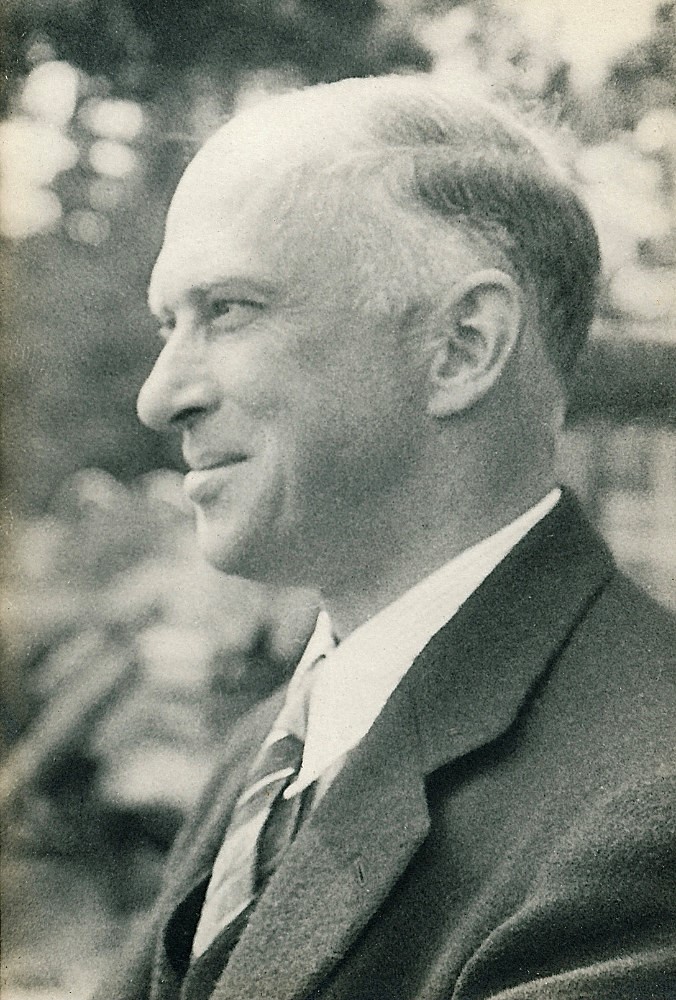 Thomas A. Walker
Thomas A. Walker
During the early 1950's Thomas A. Walker converted the company stock that he and his brother, Alex, held into bonds. Apparently he recognized that the U.S. steel industry was in decline. When the bonds paid off, we presume that Alex used his share of the proceeds to fund the Alex C. Walker Foundation. In 1968 Teledyne Inc. acquired Columbia Steel and Shafting Co. The Carnegie facility continued operations until it was closed in 1990 when operations were consolidated with Summerill's plant in Scottdale, PA. The company name was then changed to Columbia-Summerill, Inc., a Teledyne Company".
7
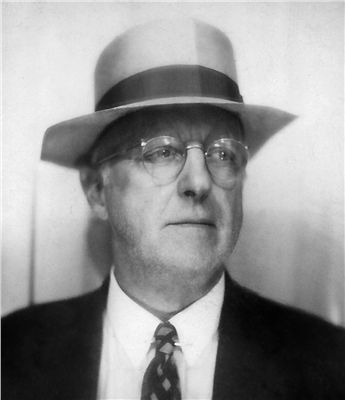 Alex C. Walker in 1954
Alex C. Walker in 1954
Unlike his brother, Alex never married. After the sale of the business, Alex traveled to Europe and around the United States. He then moved from the smoky, industrial city of Pittsburgh to Florida in about 1940 to protect his health. Thomas U. Walker, Sr. personally knew Alex and recommended that Alex hire an experienced attorney to draw up his will. Before Alex passed away in 1968, he made provisions through his will to establish a family charitable foundation for the purpose of funding organizations and programs devoted to the fostering of the free enterprise system.
Thomas A. Walkers' sons, Thomas Urling Walker, Sr. and Barrett Cubbage Walker were appointed as the first trustees. They began serving in 1979 during the late stage of the Cold War that saw an increase in hostility between the Soviet Union and the West. Early grants funded studies and other projects supporting free markets during the ideological struggle between Capitalism and Communism.
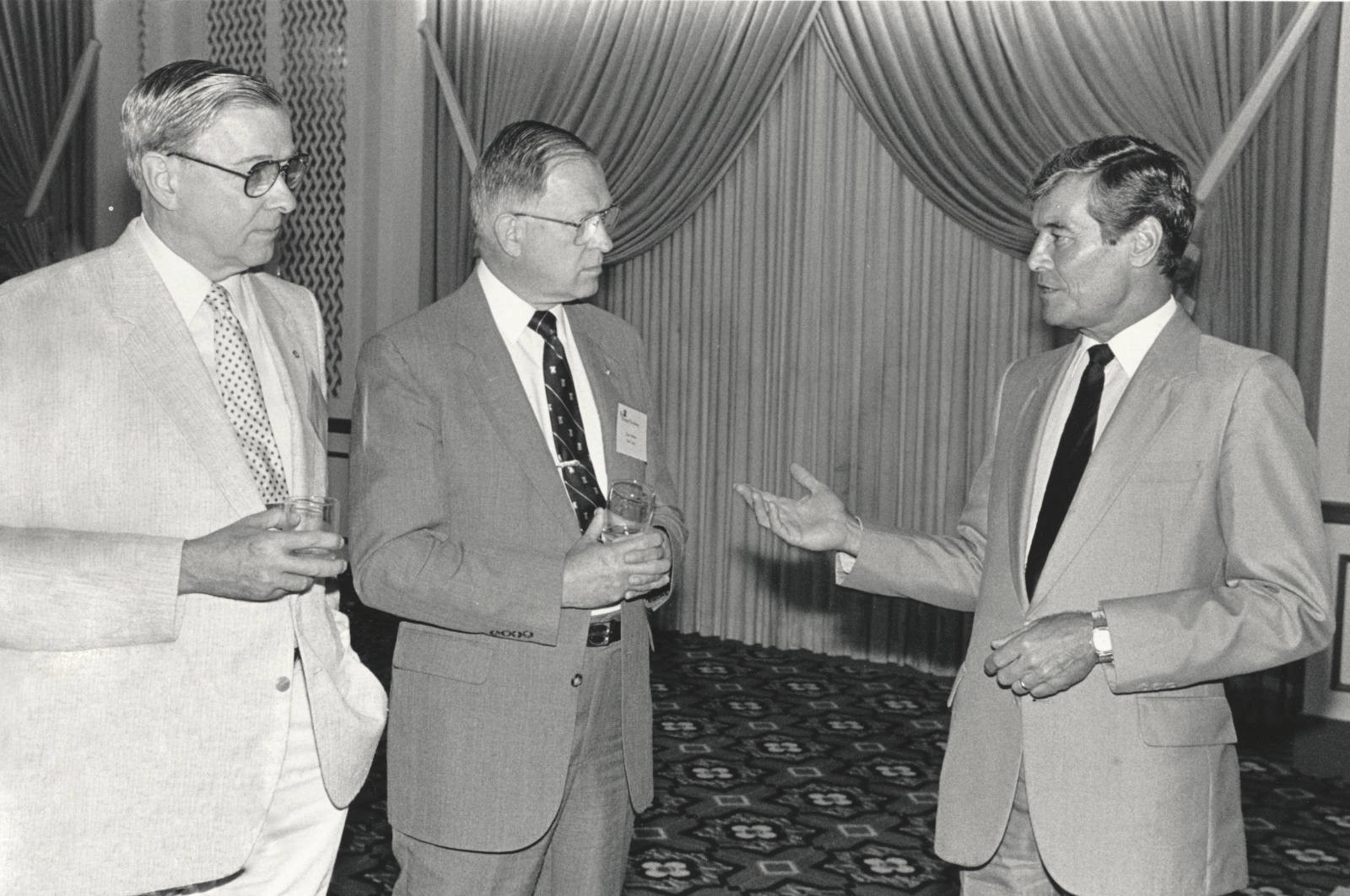 Barrett C. & Thomas U. Walker talking with Republican Congressman, Phil Crane, in 1987.
Barrett C. & Thomas U. Walker talking with Republican Congressman, Phil Crane, in 1987.
In 1981 they received permission from the court to name their sons as successor trustees and established a procedure for appointing future trustees from the Walker family.
8 Upon the retirement of their fathers, Thomas Walker, Jr. and Barrett P. Walker became family trustees effective Jan 1, 1998.
Barrett P. Walker serves as director, managing the grant program and the Foundation website. Pittsburgh National Bank, was named as a corporate trustee. In 1983 Pittsburgh National Bank merged with Provident National Bank of Philadelphia to form PNC Bank Corp. PNC Bank manages the Foundation's investments.
 Three generations of the Walker Family met in Pittsburgh, in 1992 to review the history of the former family steel businesses. They also studied the decline of the City due to pollution and flooding, and the City’s renaissance resulting from an environmental clean-up and reinvestment in infrastructure.
Three generations of the Walker Family met in Pittsburgh, in 1992 to review the history of the former family steel businesses. They also studied the decline of the City due to pollution and flooding, and the City’s renaissance resulting from an environmental clean-up and reinvestment in infrastructure.
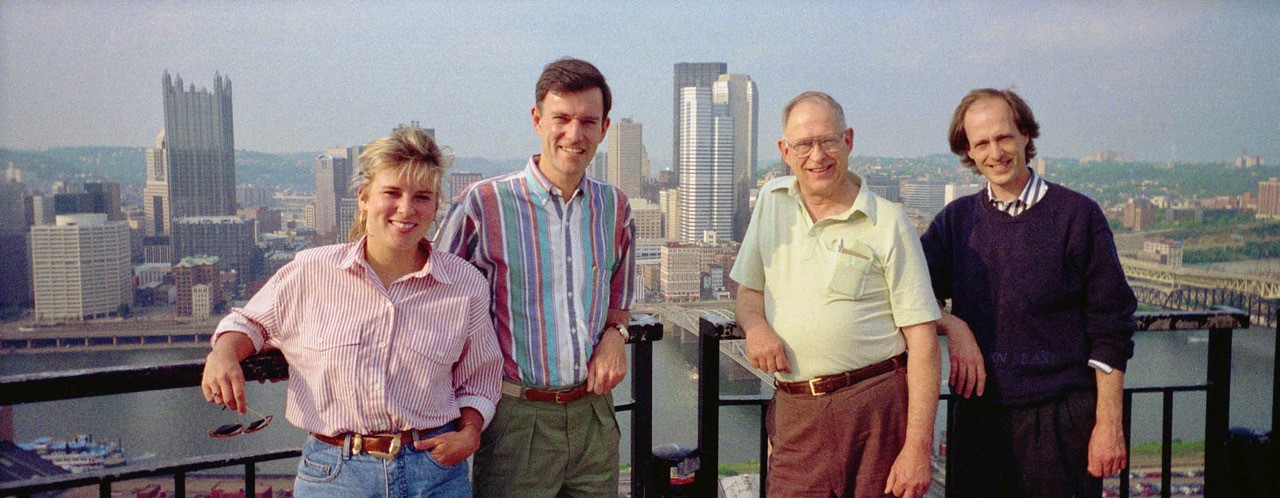 From left, Kiara L. Walker, Barrett P. Walker, Thomas U. Walker, Sr., and Thomas U. Walker, Jr. overlooking Pittsburgh.
From left, Kiara L. Walker, Barrett P. Walker, Thomas U. Walker, Sr., and Thomas U. Walker, Jr. overlooking Pittsburgh.
- Last Will and Testament of Alex C. Walker.
- Jordan - Genealogical and Personal History of Western Pennsylvania, p. 599.
- Edwards - Industries of Pittsburgh, p. 264
- The Plumbers' Trade Journal, Steam and hot water Fitters' Review. V. 41, Jan 1, 1907, p. 75.
- The Iron Trade Review, V. 62, April 18, 1918, p. 1001.
- Jordan, p.600.
- History of Colunbia Steel & Shafting obtained by Barrett P. Walker calling member of the Summerill Family at Summerill Tube Corp.
- Order of Allegheny County Orphan's Court, vol. 589, P. 597.
Next